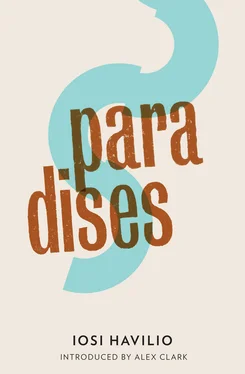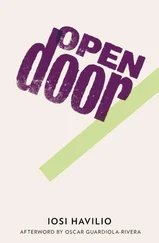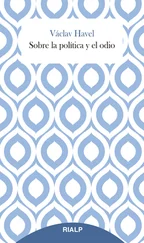Iosi Havilio - Paradises
Здесь есть возможность читать онлайн «Iosi Havilio - Paradises» весь текст электронной книги совершенно бесплатно (целиком полную версию без сокращений). В некоторых случаях можно слушать аудио, скачать через торрент в формате fb2 и присутствует краткое содержание. Год выпуска: 2013, Издательство: And Other Stories, Жанр: Современная проза, на английском языке. Описание произведения, (предисловие) а так же отзывы посетителей доступны на портале библиотеки ЛибКат.
- Название:Paradises
- Автор:
- Издательство:And Other Stories
- Жанр:
- Год:2013
- ISBN:нет данных
- Рейтинг книги:3 / 5. Голосов: 1
-
Избранное:Добавить в избранное
- Отзывы:
-
Ваша оценка:
- 60
- 1
- 2
- 3
- 4
- 5
Paradises: краткое содержание, описание и аннотация
Предлагаем к чтению аннотацию, описание, краткое содержание или предисловие (зависит от того, что написал сам автор книги «Paradises»). Если вы не нашли необходимую информацию о книге — напишите в комментариях, мы постараемся отыскать её.
is an almost perfect novel." — Albert Camus's
reimagined with a female lead in in twenty-first-century Buenos Aires.
Recently widowed, a young woman leaves the countryside for Buenos Aires with her four-year-old son where she seeks to build a new life for herself. She finds work in the zoo and moves into the human zoo of a squatted tower block at the invitation of one of its residents, to whom she acts as nurse, giving morphine injections.
Paradises — читать онлайн бесплатно полную книгу (весь текст) целиком
Ниже представлен текст книги, разбитый по страницам. Система сохранения места последней прочитанной страницы, позволяет с удобством читать онлайн бесплатно книгу «Paradises», без необходимости каждый раз заново искать на чём Вы остановились. Поставьте закладку, и сможете в любой момент перейти на страницу, на которой закончили чтение.
Интервал:
Закладка:
The DJ takes it upon himself to keep the night lively too. He directs the dancing, arranges choreography, signals to someone, a couple, a man, a single woman, the guy in the palm-tree shirt, you in the fuchsia miniskirt, he makes it clear with a laser pointer and issues instructions. A god of the night. Let’s see, let’s see the brunette shake her booty. Where are those sharks? Work it, hotties, work it, he says, his voice serious, quivering, mouth stuck to the microphone producing a series of aquatic sounds, like seal kisses. And now for this sweet cumbia . It’s going out with a subliminal message, so no one’s gonna be left with the horn.
More beer, I hurry down three glasses in one go. I lose Eloísa somewhere, I wander round several times in vain until I locate her on the dance floor. I avoid her, but she’s seen me, she stretches and catches my arm. I’d rape this guy, she says in my ear, pointing out a guy who won’t stop smiling. His friend takes advantage of the opportunity to approach me, he takes me by the waist. I have no means of escape. I move, I pretend I’m dancing. The guy sticks his mouth to my ear to speak. You’re so beautiful, he says, I don’t understand the rest. A gap between songs, I excuse myself with a flick of the hand and aim for the toilets with the bottle under my arm. On the way, I hear: Get me a …
I pee with my eyes closed. A cliff appears to me and an old-fashioned girl in petticoats with her legs up who shows me everything. In the background, a mass of flares lights up the sea. Where did that come from? On my way back, I see Eloísa jumping in the centre of a ring of three guys who are blowing her kisses and moving very close to speak to her. I look for the darkest corner and start drinking beer, without wanting to but without stopping.
Where are you going? Eloísa shouts at me, leaning over the rail a second before I disappear. I gesture to say I’m leaving. And I exaggerate the modulation so that she can read my lips: I’m zonked. Come on, she insists but this time I stand firm, I’m not going to give in. She lets me go and warns me with her index finger: Friday, don’t forget. Yes, yes, Friday.
Twenty-nine
The iguana is dead by morning. Stomach up, limbs rigid and splayed. It lived with us for nearly three weeks. I find it near the door, as if it had run out of breath during an escape attempt. It didn’t adapt, lack of humidity, too much heat, who knows. It’s also possible that it would have died if it had stayed with its siblings in the incubator, perhaps it was written in its genes. Luckily, I make the discovery before Simón wakes. I have time to wrap it in newspaper and put it in a box which I hide on top of the wardrobe. I’ll work out what to do later, how to tell him. I’ll invent something.
I put on some water for coffee. Now, after years of maté , I’ve started liking coffee. I’m hooked on the stuff during work breaks. I stay quiet, eyes on the soot-blackened kettle. Only that little snake of thick steam that leaves the spout with a strident whistle rouses me. Simón too, gradually moving into a sitting position, legs crossed, arms too, across that white, bulging abdomen, like a tiny Buddha. He surveys his surroundings with the typical disorientation of awakening, not so much lost as annoyed, contemplating the world indifferently, with no desire to understand it, as if reproaching its existence. But his disconcertedness quickly passes to whining and with his snivels everything swings back to the everyday: breakfast milk, a walk around the block if it isn’t raining, improvised lunch, the long hours of the afternoon with Herbert, television sometimes, treats to eat, night-time and the battle with sleep.
It’s a cloudy day, asphyxiating and gelatinous. A day that infects everyone equally with its dull oppression. Even Herbert, always so lively, turns up with a long face. As if he’s slept badly. I’ve never seen him like this, I’m about to ask him if something’s wrong, but I hold my words in time. I try to put myself in his place, best not to pester him. If he wants to talk, it has to come from him. I restrict myself to telling him that there are sausages and rice in the pan, that we’ve already eaten, he can help himself. Despite his bad mood, he issues a quiet thank you, through his teeth. I bump into Benito in the corridor, carrying buckets. He looks down at me from his great height, with a mixture of contempt and desolation. Hi, I say, and he responds with a grunt.
My arrival at the zoo only confirms this expansive wave of irritation. Yessica won’t tire of bad-mouthing God knows who all afternoon, presumably some superior who ordered her to clean the toilets. The staff from the company in charge of hygiene is on strike again and this time they didn’t even send an emergency replacement. At one point I approach her with intentions of solidarity, to offer a hand, but it turns out I only lend her my ear, scarcely a pleasure. I’ve never seen so much shit in one place, she says. It’s incredible, as if they all agreed to come and crap here. I wonder, she says challengingly, gloved hands on her hips, raising her voice as if she wants those who have been here before us to know we’re talking about them and apologise: Don’t these wretches have bathrooms in their own homes? I’m an idiot, she mutters, her eyes red, about to burst into tears. It’s my fault, I should have refused.
I walk past the nursery, I think about the iguana and the fact that I’m now faced with two deceptions for the same reason. Even Esteban hasn’t escaped the tone of the day. He comes and goes along the corridors of the reptile house, cupped hand protecting his left cheek, without paying any attention to his little creatures, as he calls them when he’s in a good mood. The despondency is justified in his case. I find out he’s just come from the dentist, the guy took out the wrong molar and now he’s in twice as much pain. Because of the infection that’s still there and because of the needlessly exposed gum. At break time, seeing Canetti limp towards me clutching a coffee, I pretend not to notice, scratching my neck, and set off towards the bears. I’d definitely rather avoid him today.
Without stopping, I gesture to Iris to come and find me, although I’m not sure whether she notices. A few minutes pass and when I’m starting to convince myself that she didn’t see me at all, I feel someone touch my shoulder by the elephants’ palace, scaring me slightly. Iris smiles, her lips retracted, rather dismal. We walk round the lion pit, Hércules and Corazón, the decrepit male and the blind female. So sad, says Iris, and I’m not sure what she’s referring to.
The time we spend together seems like a preamble to something serious she has to say but it doesn’t come out. She doesn’t look at me, her eyes dart in all directions, a broom bush, two posing flamingos, nowhere at all. I think about her father, I think the worst. I can’t bear to ask her. Finally she speaks: I’m bringing forward my return home. I’m leaving next week. I’m sorry and I was right: His bones are gone, he can’t even get out of bed any more. I’d like to console her, I’d hug her, I just stroke a hand. I search for her eyes, she seeks out the ground. Someone else would ask how it passed from the lungs to the bones. I can’t get the words out. It seems worse than worse. I feel bad, for her, for her father, for not knowing how to act. We say goodbye at the entrance to the reptile house. Still silent, until she turns round and says quickly, without looking at me: It’s a lie, a complete lie.
Another three hours of work and I have to pull at the same ball of wool a thousand times to try to unravel Iris. Which part is the lie? I wait for her at the exit and we start walking together towards the Fénix. At a kiosk we buy an ice cream each, strawberry for me, pineapple for her, and there’s no need to ask anything, she spills it all out herself. Draco wrote to her from the south, he says he’s working in a wine cellar and he met someone. A Belgian girl. Belgian? Yes, Belgian. They’re saving up for an expedition to Antarctica. Iris talks and with each phrase she shakes her head, out of incredulity, but also with irony. She repeats in a sarcastic tone: Antarctica. I try to imagine Draco and this girl navigating between ice floes, on a sledge, wrapped in sheepskin, sheltering in an igloo, and all around them, white, white, white. At the hotel door, Iris explains as if it were necessary: My father is much better. I embrace her and finally she cries.
Читать дальшеИнтервал:
Закладка:
Похожие книги на «Paradises»
Представляем Вашему вниманию похожие книги на «Paradises» списком для выбора. Мы отобрали схожую по названию и смыслу литературу в надежде предоставить читателям больше вариантов отыскать новые, интересные, ещё непрочитанные произведения.
Обсуждение, отзывы о книге «Paradises» и просто собственные мнения читателей. Оставьте ваши комментарии, напишите, что Вы думаете о произведении, его смысле или главных героях. Укажите что конкретно понравилось, а что нет, и почему Вы так считаете.











